Is It Against the Law to Record Somebody Again
Is It Illegal to Record Someone Without Their Permission?

Edited by
Nov 26, 2021
Is it illegal to record someone without their knowledge, even by accident? In this post, we'll discuss this farther. But first, a summary of what could and should happen if y'all record someone without their consent.
| Case scenario | What could or should happen |
|---|---|
| Confront recording in public | Blur strangers' faces and remove audio. |
| Recording someone in your own home | According to U.S. law, you may record people with a subconscious photographic camera in your firm without them knowing. |
| Filming in private areas | You need to talk to the owner and ask for a laissez passer before recording. |
| Filming constabulary and other law enforcement officials | Interfering with law enforcement, which tin depend on the jurisdiction, can country you in trouble. |
| Video pranks and creating videos | As long as the one recording isn't doing anything illegal/illicit with the video in the U.S., it's not in a private area. |
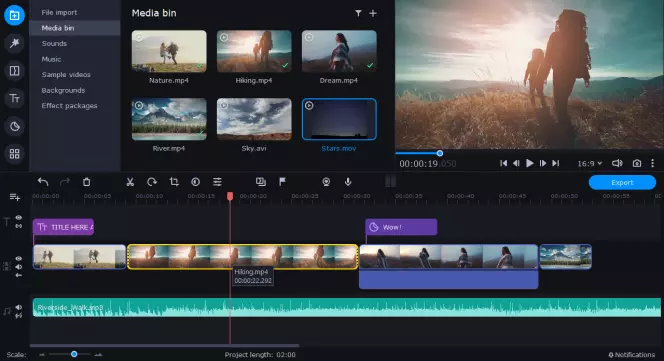
If you're looking for video-editing software, effort Movavi Video Editor Plus. The programme is piece of cake to use, even for beginners, and the trial version is free. This editing software can make it easier for you to consummate your recordings and avert violation of privacy: you tin hands blur out faces and remove audio from your clips. Movavi Video Editor Plus also has other video-editing features you may demand: cut and trim your video, add filters and transitions, edit audio tracks, and and then much more!
Is it illegal to record someone without their knowledge?
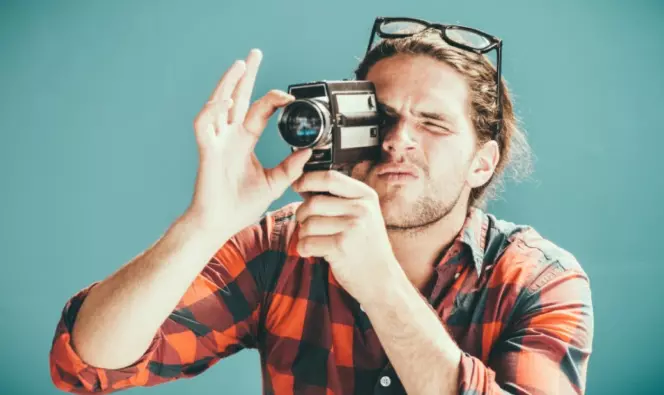
So, is it illegal to tape someone without their permission? It is not illegal to tape someone without their consent in a public place if they are visible and aural, especially if they don't have reasonable expectations of privacy. But in a private setting, such as a bath or changing area, recording someone without their cognition is illegal.
When you go out in public, someone volition certainly tape you without your consent. Office buildings, malls, and stadiums all take security cameras. You see tourists taking panoramic videos as you walk forth the sidewalks. News crews, vloggers, or parents may capture you while filming their kids' birthday parties in the park.
Is it illegal to video record someone without their consent? Read on to learn more than about the popular recording cases and laws.
Face recording in public
If you're recording someone's face up in public, y'all'll need to blur strangers' faces and remove sound. If yous desire to reproduce people'south faces in a magazine or a paper, get their permission in writing first. If information technology's a celebrity or president, they are already public figures, so you tin can reproduce their pictures equally long as you lot don't defame or lie about them. With the president and his family, you need to exist very conscientious. The famous can sue you easily.
Recording someone in your ain home
Co-ordinate to U.Southward. law, you may record someone in your own home with a hidden camera without them knowing. The law in many states now allows parents to record nannies. Family members tin also record caregivers for elderly loved ones to ensure they are safe while receiving care. For this reason, parents and guardians whose workplace is far from home are increasingly turning to nanny cams. To be sure that you are post-obit the laws in your state, it'southward a expert idea to inquiry subconscious cameras and nanny cams before placing ane in your dwelling.
If you lot plan to use your photographic camera in specific ways, you may as well want to seek the advice of an chaser.
The deviation between audio and video record someone in public is a crucial distinction to go along in mind. In the United States, audio surveillance is subject to many harsher restrictions, which we'll dig into further in this article. In nearly states, recording subconscious camera videos in areas with reasonable expectations of privacy is illegal. If your subject area lives with you – such as a alive-in nanny – this may include bathrooms and bedrooms.
Filming in private areas
And so, is it against the law to tape someone in individual areas? You lot may record both video and audio when yous're in a public place or on private property with permission. This includes restaurants, parking lots, supermarkets, churches, and whatsoever other places that are commercial/business concern. Here, you need to talk to the possessor and ask for a laissez passer before recording. Unless you ask permission and your "talent" agrees, it'due south probably all-time to blur the faces in these areas.
There is no federal or land law prohibiting sound recording for belongings owners, but many businesses may deny it on individual holding. Always inquire, "do you lot need permission to record someone?" But companies like Airbnb allow brusk-term rental owners to place recording devices on the property, such as security cameras and baby monitors. The holding list must mention this upfront, even where the gadgets are offline. Private areas like bedrooms and bathrooms cannot accept recording devices.
Filming constabulary and other police force enforcement officials
When law enforcement officers abort on public holding – even if they ask you to stop recording – yous may record them. The ACLU says police officers may non take your phone or camera or require y'all to show them recordings. In addition, they cannot demand that y'all delete audio or videos without a court society. If you interfere with police force enforcement, which depends on the jurisdiction, yous could be in trouble.
Recording someone at work
Recording a chat in the workplace is not illegal. Employees who appoint in such conduct could face disciplinary procedures or dismissal. Employees can use a recording they fabricated in a tribunal case as show if they were nowadays at the time of the recording. A general rule established by past cases states that the employee'southward presence is required for the recording to be admissible. Therefore, if an employee leaves a hugger-mugger recording device behind after departing from a room, the recording probably will non be open-door equally proof.
This is non a hard and fast rule, and new cases could accept dissimilar outcomes. Tribunals are likely to accept an extremely dim view of employers secretly recording their employees at work. Don't get tempted. Investigate and follow formal disciplinary procedures earlier terminating or threatening an employee.
Employees may want to record a conversation for several reasons, such every bit:
- In case they need to refer to it after
- As show in court
- For improper purposes, such every bit to apply every bit blackmail
- You lot tin can let the employee to tape if they ask for your permission.
Y'all should inform your employees ahead of time that you volition non allow them to record a coming together or conversation. In your employee handbook, brand clear what actions you consider misconduct so that your employees know how to act. A common requirement in disciplinary policies is that all parties must consent to brand a recording before it occurs.
Recording conversations
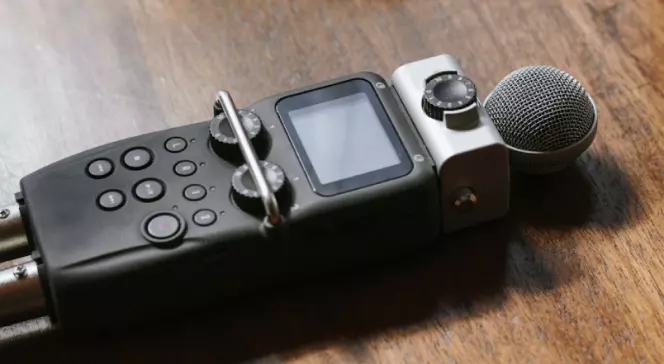
In the law corridors, consent is the well-nigh critical factor when recording calls. It is polite to inform everyone involved that y'all may tape the conversation every bit a general dominion. Just, in certain states, the law only requires a single person to know. As role of the Motorbus Criminal offense Control and Safe Streets Act of 1968, the government passed the Wiretap Deed later on the public outcry over the covert recordings of activists in the 1960s. (xviii U.S.C. § 2510.)
The federal Wiretap Act prohibits anyone from secretly recording oral or telephonic communications that other parties believe intimate or private. (18 U.Southward.C. § 2511.) Even so, in that location are varying laws regarding the legality of recording oral, telephonic, and other communications in different states. Unless federal law has stronger privacy protection, a secret recording of a conversation is nether the state'due south laws in which it happened.
The Wiretap Act does not use if:
- At least one person in the conversation consents to the recording
- The one recording has permission from the law
It ways in practice that recording a chat with the consent of the person making the recording is legal under 18 U.s.C. 2511.
Observing reasonable privacy expectations
Each country's cloak-and-dagger recording constabulary and the Wiretap Act just protect individuals who expect their communications to remain private. Whether i has a reasonable expectation of privacy in a situation depends upon the context:
- Did the conversation take place in a public or private setting?
- Did the person being recorded regard it as a private matter?
For example, if a person tells a party he cheated a friend in a concern deal and records it, he cannot object if you use information technology in court if you sue them.
Ane-party consent
With the consent of a party, y'all can record a conversation if you lot're a participant. You can record a conversation or cell telephone call if you're non a party to it, provided the other party consents to it subsequently existence notified. The 18 U.s.C.* 2511 (2) (d) simply requires approval from 1 party. Along with this Federal statute, 38 states and the Commune of Columbia also crave 1-party consent.
Consent from all parties
Eleven states require everyone involved in a conversation or phone call to consent to the recording. Sometimes called "ii-party" consent laws, it needs all parties to give exact consent before recording can occur. As long equally one-party consents, the federal Wiretap Act and nigh country laws that allow secret recordings allow covert recordings.
Here are some examples of consent:
- Directly when one party records another.
- Helpline Calls – a consumer who holds on to a helpline after the mandatory "this chat is recorded for quality assurance."
- Explicit – a reporter's sources who agree to speak "on the record" connected with a news story.
What states crave approval from 2 parties? Those include California, Delaware, Florida, Illinois, Maryland, Massachusetts, Montana, Nevada, New Hampshire, Pennsylvania, and Washington. Currently, there are no consent laws in Vermont. But based on federal police, Vermont is a one-political party country.
Is it illegal to eavesdrop or wiretap if it does not involve y'all in the chat?
Eavesdropping involves overhearing, recording, amplifying, and transmitting any part of a private conversation behind the parties engaged in the discussion. Placing a "bug" within the premises of a individual business organisation to tape private conversations. Or a "wired" government informant recording any conversations happening in their vicinity.
The term "wiretap" describes the utilize of covert means to intercept, monitor, and record cell phone conversations. It refers to an unauthorized concrete connection with a communication system between the sender and receiver. Where a tertiary person overhears a message during transmission and no disruption of the concrete integrity of the advice system has taken place, information technology may be less articulate whether there has been an illegal "interception."
In the infamous Olmstead vs. the United States decision, the court held that the Fourth Amendment's search and seizure commands did non apply to regime wiretapping without trespassing private property. The determination stood for 40 years.
Calls between states/multistate
Multiple states (and even countries) may participate in a conference call that one or more parties may tape. The possibility of legally recording a conversation presents some problematic legal scenarios.
Justia.com reports some states to require consent only if participants in substitution take a "reasonable expectation of privacy," which makes the patchwork quilt of recording laws even more confusing. You lot expect privacy when yous're inside your home and not in a public surface area similar a cafe.
A consent agreement varies from state to state. As for the remaining states, Justia.com says some require explicit consent, while others are fine with unsaid permission. For instance, Nevada is a ane-party consent land, simply the Supreme Court views it as an all-party consent law, according to Justia.com.
The Maryland law says all parties must consent to record conversations, either in person or over the phone. However, the court limits consent to cases where a reasonable expectation of privacy is present. Since land and federal laws differ on recording a conversation, Justia.com recommends following the strictest or getting consent from each individual.
Maintaining privacy while recording in public
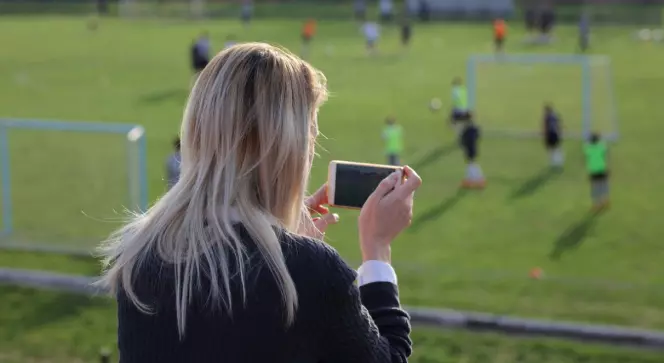
There is no unproblematic answer to questions related to recording video and sound in public places other than "it's complicated." Laws, regulations, and rules differ among federal, state, and municipal governments. There is a particular concern about audio-visual recording versus photography and editorial versus commercial utilise.
For recording, the general rule is: where at that place is public access in areas such as a sidewalk or a park (people and buildings), it is permissible to record annihilation in plain sight considering in that location is no reasonable expectation of privacy in these areas. A mall, for example, may have signs that restrict recording in the regions that are open to the public but owned privately. Earlier taking any recording, information technology is always a good idea to ask for permission from property owners.
Practical tips
Recording telephone conversations and calls
Information technology is helpful to tape conversations, interviews, and phone calls using a recording device, such equally a microphone, video recorder, Skype, or camera. It serves as a great way to certificate events in courtroom or public meetings, whether for personal use or broadcast online. Keep out of legal trouble when you record conversations, phone calls, meetings, and hearings with the post-obit tips.
- Before recording a telephone call or conversation, check the police in your land: You lot volition need to be aware of the law before recording phone calls and conversations without consent, or you may incur criminal or civil liability. Equally y'all practise your research, consider your country's consent requirement, east.g., whether ane party's consent makes upwards consent or whether yous need all parties' consent to tape.
-
Record consent: If you want to prove y'all got consent, record it along with the telephone call or conversation. This will require:
1. Inform the person you intend to record
two. Get off-the-record consent
iii. If the person agrees to the recording, start the recording and ask for an on-the-record confirmation from them.
- Be honest: Hugger-mugger recordings are illegal in some states, even in public places. If possible, let everyone know y'all are recording. By being upfront with recording, you requite people a hazard to object and undercut whatever argument that you are being secretive.
Consider your location carefully
Plan your locations carefully if you intend to record a video for a picture show contest or share information technology online. Recordings in individual homes and businesses require the owner's permission. Ensure that people don't have a reasonable expectation of privacy if you are in a public place. Don't record in irresolute rooms, locker rooms, or restrooms. Ensure that you don't plan to record in an obvious place in your abode, and warning people if y'all plan to tape in an area; they might look privacy.
The final verdict
Tin you record someone without their consent? That depends on the reasons, intent, and which state you are in. Ensure that you understand both your rights to record and the consequences of recording without the other person'southward permission.
If a person is in a public location, what you may assume to be consent does non mean the individual agrees to yous recording them. It may violate their privacy rights. When in doubt, i should apply morality and common sense. But always get consent to avoid legal repercussions.
Ben is a writer from the Uk with qualifications in Media and Music Technology, he specialises in software reviews and tutorials. Ben has been blogging nigh media and tech subjects since he was a teenager from his base in the Due east of England.
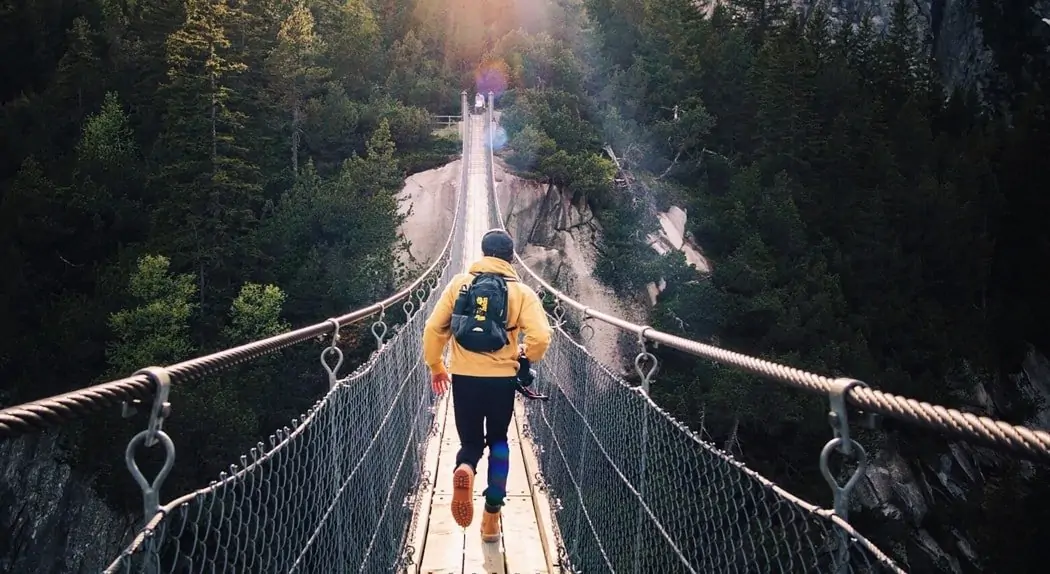
Movavi Video Editor Plus
Make videos. Create. Inspire.
Frequently asked questions
Can I sue someone for recording me without consent?
In virtually public places, recording someone happens all the time: security cameras, smart devices, and smartphones are everywhere. In most states, you lot can vocalism tape or video record in public places besides. Although the Fourth Subpoena to the Constitution of the The states protects your right to privacy, y'all should have a reasonable expectation of privacy. If someone records you without your permission, you may sue them in a modest claims court under certain conditions.
A recording must meet certain circumstances and laws for a lawsuit to be valid. Among them are:
- The caller didn't notify y'all most the recording
- There was a reasonable expectation of privacy, such as in a doctor'south office or on private property.
- You expected your conversation or activity to be private, but they recorded information technology.
- There was no warrant from federal or state authorities.
It's a good idea to check your state's recording laws before you sue in modest claims court. If the person doing the recording consents to the recording, many states permit the recording of a conversation. Unmarried-party consent is what most states call this. Others require consent from all parties. In either case, information technology violates your privacy if someone records y'all without beingness part of the conversation, and you can sue them.
Tin someone record me without my permission?
Most states and the Wiretap Human activity let appetent recordings if one party consents. The consent can be implicit or explicit. By tacit consent, we mean ane side of the conversation is openly recording the other. The same thing could happen if a consumer holds on to a customer service telephone call despite a quality assurance recording warning.
An excellent example of explicit consent is when a journalist's source agrees to speak "on tape" for a news detail. There can be consequences if you violate federal and country recording laws. Your punishment may include paying damages to the victim of the criminal offence or jail time.
When someone records you without your consent while yous await some level of privacy, so that makes upward an infringement of your rights, for which you lot may file a civil lawsuit. Yous may win the case and receive a handsome settlement. Y'all should contact your local police and file a ceremonious suit against anyone who has violated your right to privacy.
Is information technology legal to record a conversation?
Attorneys volition tell yous it depends! It is important to remember that if you lot provide police force or a approximate with evidence recorded with an illegal device or unlawfully, you may confront more severe punishment than the person you defenseless in the act. Always follow the law and know your rights. Speak with an experienced chaser if in doubt.
Information technology depends on the situation, merely the answer is YES. The rules for recording calls go beyond consent. If there is a valid reason for collecting relevant data, it is possible to record sound conversations. According to the GDPR, recording of conversations is legal. Even so, there are additional requirements to protect the rights and freedoms of data subjects. Considering GDPR, all parties recording a conversation need to justify their actions.
Source: https://www.movavi.com/learning-portal/is-it-illegal-to-record-someone.html

0 Response to "Is It Against the Law to Record Somebody Again"
Post a Comment